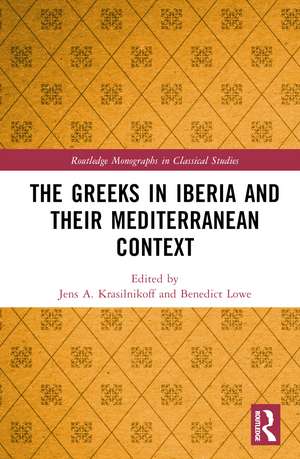The Greeks in Iberia and their Mediterranean Context: Routledge Monographs in Classical Studies
Editat de Jens A. Krasilnikoff, Benedict Loween Limba Engleză Hardback – 29 noi 2023
Contributions cover the Phocaean settlement at Emporion and its relationship with the indigenous hinterland, the government of the Greek communities, Greek settlement and trade at Málaga, the Greek settlement of Santa Pola, Greek trade in Southern France and Eastern Spain, the implications of imported Attic pottery in the fifth and fourth centuries BC and the conception of Iberia in the eyes of the Greeks. The Iberian Peninsula invites discussion of key notions of ethnic identity, the use of code-switching, cultural geography and the role of society in generating, developing and exploiting social memory in a changing world. The contributions in this volume provide a variety of responses and interpretations of the Greek presence, reflecting the extent of this debate and offering different approaches in order to better understand the range of evidence from the Iberian Peninsula.
The Greeks in Iberia and their Mediterranean Context develops current research on the Greek presence, presenting diverse opinions and new interpretations that are of interest not only to scholars studying the Iberian Peninsula and Greek settlement but also students of identity, cultural geography and colonisation more widely, as well as the applicability of these concepts to the historical record.
Din seria Routledge Monographs in Classical Studies
-
 Preț: 310.65 lei
Preț: 310.65 lei -
 Preț: 312.65 lei
Preț: 312.65 lei -
 Preț: 310.81 lei
Preț: 310.81 lei -
 Preț: 311.43 lei
Preț: 311.43 lei -
 Preț: 325.06 lei
Preț: 325.06 lei -
 Preț: 311.37 lei
Preț: 311.37 lei -
 Preț: 312.02 lei
Preț: 312.02 lei - 9%
 Preț: 935.67 lei
Preț: 935.67 lei - 9%
 Preț: 1039.83 lei
Preț: 1039.83 lei -
 Preț: 310.37 lei
Preț: 310.37 lei - 9%
 Preț: 970.53 lei
Preț: 970.53 lei -
 Preț: 312.56 lei
Preț: 312.56 lei -
 Preț: 311.18 lei
Preț: 311.18 lei -
 Preț: 325.55 lei
Preț: 325.55 lei -
 Preț: 309.90 lei
Preț: 309.90 lei -
 Preț: 311.41 lei
Preț: 311.41 lei - 9%
 Preț: 936.87 lei
Preț: 936.87 lei - 8%
 Preț: 383.06 lei
Preț: 383.06 lei - 48%
 Preț: 570.60 lei
Preț: 570.60 lei -
 Preț: 488.71 lei
Preț: 488.71 lei - 29%
 Preț: 995.97 lei
Preț: 995.97 lei -
 Preț: 482.27 lei
Preț: 482.27 lei - 18%
 Preț: 946.74 lei
Preț: 946.74 lei -
 Preț: 484.47 lei
Preț: 484.47 lei - 15%
 Preț: 427.16 lei
Preț: 427.16 lei -
 Preț: 369.77 lei
Preț: 369.77 lei -
 Preț: 386.77 lei
Preț: 386.77 lei - 18%
 Preț: 1109.51 lei
Preț: 1109.51 lei - 30%
 Preț: 849.65 lei
Preț: 849.65 lei - 23%
 Preț: 321.20 lei
Preț: 321.20 lei - 18%
 Preț: 956.39 lei
Preț: 956.39 lei - 15%
 Preț: 427.16 lei
Preț: 427.16 lei - 18%
 Preț: 1060.25 lei
Preț: 1060.25 lei - 15%
 Preț: 427.16 lei
Preț: 427.16 lei - 18%
 Preț: 1119.16 lei
Preț: 1119.16 lei -
 Preț: 371.71 lei
Preț: 371.71 lei -
 Preț: 452.14 lei
Preț: 452.14 lei - 26%
 Preț: 765.59 lei
Preț: 765.59 lei - 30%
 Preț: 819.48 lei
Preț: 819.48 lei -
 Preț: 416.22 lei
Preț: 416.22 lei - 18%
 Preț: 1050.78 lei
Preț: 1050.78 lei
Preț: 1004.24 lei
Preț vechi: 1224.69 lei
-18% Nou
Puncte Express: 1506
Preț estimativ în valută:
192.19€ • 199.90$ • 158.66£
192.19€ • 199.90$ • 158.66£
Carte tipărită la comandă
Livrare economică 14-28 aprilie
Preluare comenzi: 021 569.72.76
Specificații
ISBN-13: 9781032470900
ISBN-10: 1032470909
Pagini: 276
Ilustrații: 50 Halftones, black and white; 50 Illustrations, black and white
Dimensiuni: 156 x 234 x 18 mm
Greutate: 0.57 kg
Ediția:1
Editura: Taylor & Francis
Colecția Routledge
Seria Routledge Monographs in Classical Studies
Locul publicării:Oxford, United Kingdom
ISBN-10: 1032470909
Pagini: 276
Ilustrații: 50 Halftones, black and white; 50 Illustrations, black and white
Dimensiuni: 156 x 234 x 18 mm
Greutate: 0.57 kg
Ediția:1
Editura: Taylor & Francis
Colecția Routledge
Seria Routledge Monographs in Classical Studies
Locul publicării:Oxford, United Kingdom
Public țintă
Postgraduate and Undergraduate AdvancedCuprins
1. Iberia and the Greek World: What Role for the Greeks in Iberia? 2. Exchanges between the Greek World and the Iberian Peninsula from the Eighth to the Fourth Century BC 3. The Merchants of Emporion: Selling (and Being) Greek in the Iberian Market 4. Some Experiential Observations on Trading, Farming and Sharing of Place in 6th to 2nd Century BC Emporion 5. Footprints in the Sea: Strabo’s Τρία Πολίχνια Μασσαλιωτῶν and the Greeks in the Levant 6. Iberian Or Greek?: Current Debate on the Coastal Settlement of La Picola (Santa Pola, Alicante) 7. The Greeks and the Bay of Málaga: Five Centuries of Relationships and the Trade in the Phoenician West 8. Images in Motion: Fourth Century BC Athenian Pottery from the Iberian Peninsula: Workshops and Iconography 9. Piracy and the Western Greek Experience 10. Dionysius I of Syracuse and the Spatial Order of Rule By One: The Early 4th Century Syracusan Arché as Cultural Contact Zone and Food System 11. Cultural Memory and Cultural Change in Hellenistic and Roman Magna Graecia 12. Assessing Identities in Culturally Diverse Archaeological Contexts: Funerary Case Studies from Magna Graecia
Notă biografică
Jens A. Krasilnikoff is Associate Professor in Greek and Hellenistic history at the Department of History and Classical Studies, Aarhus University, Denmark. He recently published articles on the rural economy of Classical Greece and co-edited volumes on Greek religion and the cultural history of Alexandria.
Benedict Lowe is Professor of History at the University of North Alabama. He is the author of Roman Iberia: Economy, Society and Empire, and a forthcoming history of Cádiz.
Benedict Lowe is Professor of History at the University of North Alabama. He is the author of Roman Iberia: Economy, Society and Empire, and a forthcoming history of Cádiz.
Descriere
This volume explores the effects of Greek presence in the Iberian Peninsula, and how this Iberian Greek experience evolved in resonance with its neighbouring region, the Mediterranean West.
